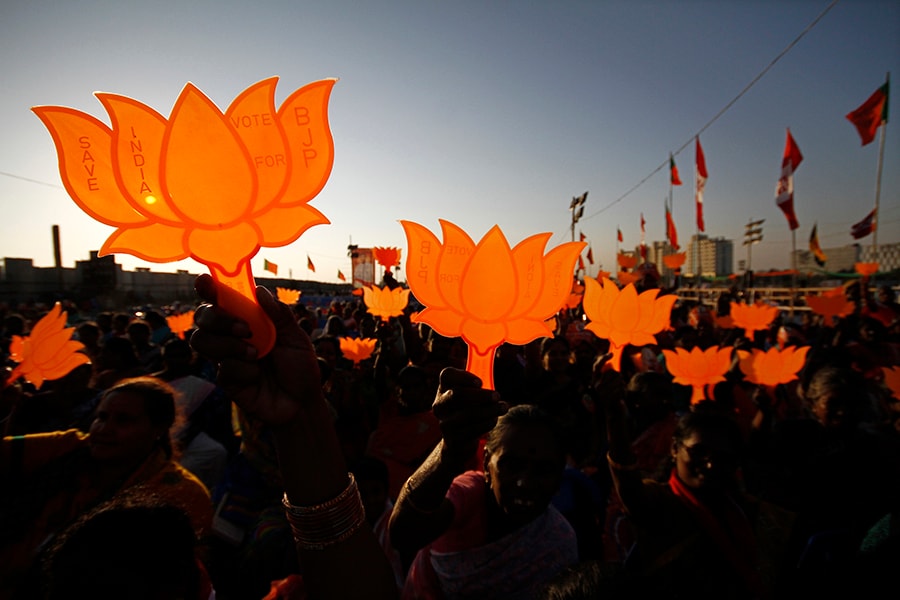India's stock markets, rupee rally smartly in euphoria over BJP poll victories
Experts forecast more gains led by economic growth and attractive valuations


 The results from the state elections, particularly the most populated state of Uttar Pradesh, were seen as important events for the BJP
The results from the state elections, particularly the most populated state of Uttar Pradesh, were seen as important events for the BJP
Image: Babu Babu / Reuters (Image for illustrative purposes)
India’s stock market indices rallied over two percent on Tuesday morning, after a long weekend, with the Nifty 50 hitting a record high after nearly two years, buoyed by the Bharatiya Janata Party’s (BJP) emphatic state assembly election victories in Uttar Pradesh and Uttarakhand, results for which were announced on Saturday.
The Nifty 50 hit a new lifetime high of 9,122.75 points in early morning trade, up by 2.10 percent or 188.2 points over its previous close of 8,934.55. The Nifty index’s previous high was 9.119.20 on March 4, 2015. The benchmark 30-share Sensex index also soared in morning trade to 29,561.93 points, up by 2.12 percent or 615.7 points over its previous close.
The Nifty 50 finally closed up 1.72 percent at 9,087, the first time the index closed above 9,000 levels and the Sensex ended up by 1.71 percent over their previous close.
Bank, capital goods and property/housing finance stocks rose the sharpest. Indices edged downwards marginally on a bit of profit taking.
The rupee also opened at a one-year high against the dollar at 66.20 on Tuesday, against 66.60 on Friday last.
The results from these state elections, particularly the most populated state of Uttar Pradesh, were seen as important events for the BJP, being the first after the controversial demonetisation move, on November 8 last year.
“India’s markets appear to be on strong ground, independent of this (state elections) event. We believe that the earnings growth cycle has started to turn for the positive and will surprise on the upside,” says Ridham Desai, managing director at Morgan Stanley India.
Improved economic growth and reasonable valuations will push equities higher, he said. “The election earnings are a sentiment booster, but we hope that the ruling government does not get carried away by these results,” Desai told Forbes India.
India’s corporate earnings for the quarter ended December 2016 were a mixed bag, with concerns over banks’ profitability weighing sentiment down.
Tuesday’s stock market highs come after India’s industrial production (IP) growth rebounded to 2.7 percent year-on-year in January, recovering from an upwardly revised -0.1 percent year-on-year in December, above expectations. “Overall, industrial activity has improved in January, after the contraction in December, suggesting that the negative growth effects of demonetisation are gradually waning,” said Nomura India’s chief economist Sonal Varma.
But Varma forecasts India’s GDP to register a 6.7 percent growth for Q1FY2017-18, from around 7 percent in Q42016.
Commenting on the UP election results, Amar Ambani, head of research with IIFL, says: “Many expected a hung assembly in UP, while some, including ourselves, expected close to 200 seats for the BJP. A figure of 300 has taken all by surprise and is clearly a big thumbs-up for central government policies, demonetisation and the surgical strike.”
Ambani expected Tuesday’s rally, adding that “this firmly puts the central government's focus back on the reform path, which will enthuse market (minus any farm waiver as promised on win in UP). A thumping win in Uttarakhand is also a big plus for BJP”.
India’s stock markets have risen by nearly nine percent in 2017. This euphoria has been led by domestic demand for stocks, particularly through mutual funds and local institutional investors.
Analysts who spoke to Forbes India last week said the impact of a possible interest rate hike from the US Federal Reserve this week may be overdone. Latest US job data was better-than-expected and wages were strong, which raised speculation that the US central bank will start to hike interest rates. Some analysts have speculated that there will be at least three such hikes in the current year.
A US interest rate hike usually means bad news for emerging markets such as India. Higher rates could lead to the strengthening of the US dollar and aid its economy, while capital could flow out of other economies.
India’s economy, which is domestic consumption demand-led, is quite insulated at this stage, experts say. Earlier this month, official data showed that India’s economy grew by 7 percent in the October to December 2016 quarter, beating most expectations, when it was assumed that the impact of demonetisation would be most felt. The government has also kept the full year forecast for the economy unchanged at 7.1 percent.
First Published: Mar 14, 2017, 12:46
Subscribe Now